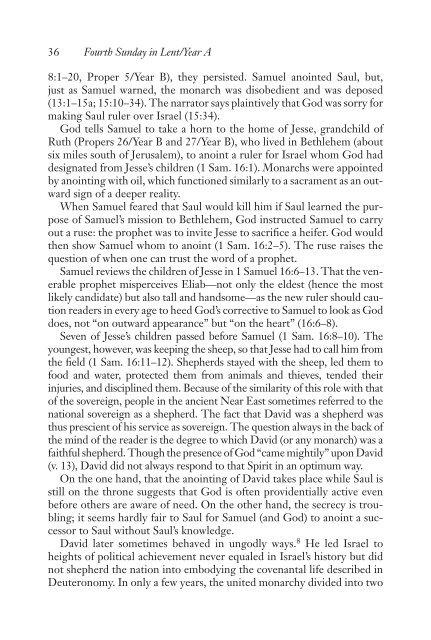000 Allen FMT (i-xxii) - The Presbyterian Leader
000 Allen FMT (i-xxii) - The Presbyterian Leader
000 Allen FMT (i-xxii) - The Presbyterian Leader
Create successful ePaper yourself
Turn your PDF publications into a flip-book with our unique Google optimized e-Paper software.
36 Fourth Sunday in Lent/Year A<br />
8:1–20, Proper 5/Year B), they persisted. Samuel anointed Saul, but,<br />
just as Samuel warned, the monarch was disobedient and was deposed<br />
(13:1–15a; 15:10–34). <strong>The</strong> narrator says plaintively that God was sorry for<br />
making Saul ruler over Israel (15:34).<br />
God tells Samuel to take a horn to the home of Jesse, grandchild of<br />
Ruth (Propers 26/Year B and 27/Year B), who lived in Bethlehem (about<br />
six miles south of Jerusalem), to anoint a ruler for Israel whom God had<br />
designated from Jesse’s children (1 Sam. 16:1). Monarchs were appointed<br />
by anointing with oil, which functioned similarly to a sacrament as an outward<br />
sign of a deeper reality.<br />
When Samuel feared that Saul would kill him if Saul learned the purpose<br />
of Samuel’s mission to Bethlehem, God instructed Samuel to carry<br />
out a ruse: the prophet was to invite Jesse to sacrifice a heifer. God would<br />
then show Samuel whom to anoint (1 Sam. 16:2–5). <strong>The</strong> ruse raises the<br />
question of when one can trust the word of a prophet.<br />
Samuel reviews the children of Jesse in 1 Samuel 16:6–13. That the venerable<br />
prophet misperceives Eliab—not only the eldest (hence the most<br />
likely candidate) but also tall and handsome—as the new ruler should caution<br />
readers in every age to heed God’s corrective to Samuel to look as God<br />
does, not “on outward appearance” but “on the heart” (16:6–8).<br />
Seven of Jesse’s children passed before Samuel (1 Sam. 16:8–10). <strong>The</strong><br />
youngest, however, was keeping the sheep, so that Jesse had to call him from<br />
the field (1 Sam. 16:11–12). Shepherds stayed with the sheep, led them to<br />
food and water, protected them from animals and thieves, tended their<br />
injuries, and disciplined them. Because of the similarity of this role with that<br />
of the sovereign, people in the ancient Near East sometimes referred to the<br />
national sovereign as a shepherd. <strong>The</strong> fact that David was a shepherd was<br />
thus prescient of his service as sovereign. <strong>The</strong> question always in the back of<br />
the mind of the reader is the degree to which David (or any monarch) was a<br />
faithful shepherd. Though the presence of God “came mightily” upon David<br />
(v. 13), David did not always respond to that Spirit in an optimum way.<br />
On the one hand, that the anointing of David takes place while Saul is<br />
still on the throne suggests that God is often providentially active even<br />
before others are aware of need. On the other hand, the secrecy is troubling;<br />
it seems hardly fair to Saul for Samuel (and God) to anoint a successor<br />
to Saul without Saul’s knowledge.<br />
David later sometimes behaved in ungodly ways. 8 He led Israel to<br />
heights of political achievement never equaled in Israel’s history but did<br />
not shepherd the nation into embodying the covenantal life described in<br />
Deuteronomy. In only a few years, the united monarchy divided into two




